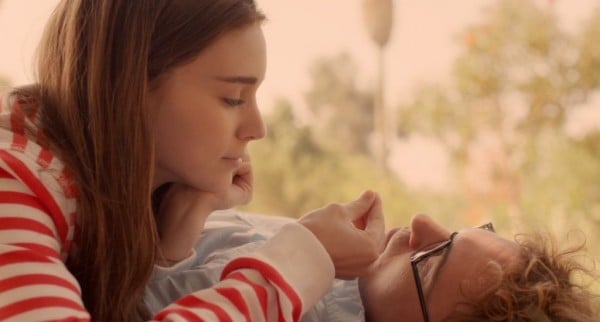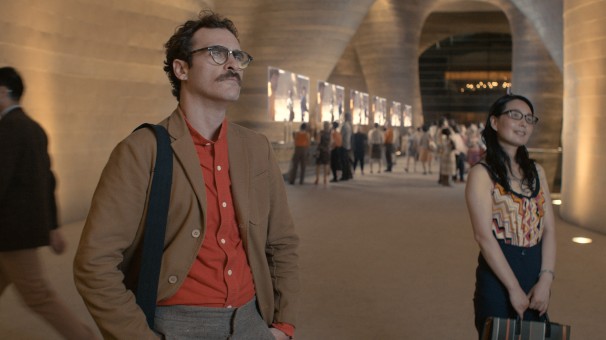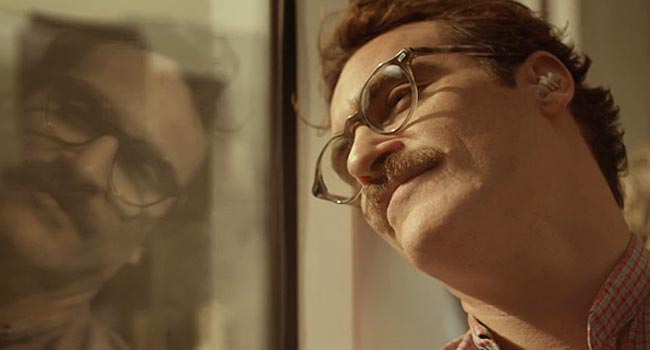Her stars Joaquin Phoenix as Theodore, the most evolved sort of man. He’s post-hipster, dresses in cardigans and old man pants, talks softly and emotes freely. It is unimaginable to think of him swilling beer while watching football or getting in a bar fight.
His job is equally feeling-centric. Set sometime in the very near future, he earns a living writing emotional letters on behalf of people who just can’t find the right words to say to their girlfriend, grandmother, or war buddy’s widow. He’s not exactly a ghostwriter, more like a valued third party in their relationships.
Smarting from the breakup of his marriage to his childhood sweetheart – the divorce is filed but not signed – along comes technology to meet his every need.

His personal device – something between a phone and a human secretary – has an operating system upgrade. After a few questions, including hilariously, “How do you feel about your mother?” the software creates for him the ideal companion.
She’s Samantha, voiced by Scarlett Johansson, and she’s perfect. Curious, intelligent, funny, insightful, Samantha is a female version of Theodore, or maybe Theodore with a female voice.
She’s not the yin to his yang. She’s the yin to his yin.
It doesn’t take long for the two to fall madly in love. Part of the genius of this film is that the viewer believes in that love. Joaquin Phoenix convinces us he is head over heels, happy, and satisfied with his virtual girlfriend. Johansson is equally remarkable in her ability to create a full character using only her voice. They’re helped by a smart and engaging script by Spike Jonze, who also directs, that creates a movie that’s surprisingly entertaining for all its philosophical subject matter.
This modern love faces challenges, however, not the least of which is Samantha’s pesky lack of a body. Sexual desire isn’t a problem, but sexual fulfillment is.
The second problem is that an intelligent personality with the ability to process trillions of bytes of information in seconds has to slow down to accommodate her human lover.
It’s an interesting conundrum, one that reaches an interesting conclusion, as far as it goes.
But I’m more taken with what the movie leaves out.
It paints a picture of modern day love that is fascinating in its assumptions, whether it be with operating systems or common human partners.
Most people would, if forced to think of it, likely agree with the idea of a person being an intimate mix of three components: The intellect, the part that mulls over On Walden Pond, remembers, plans and strategizes, and makes choices, or at least rationalizes them. The body, the part that sweats and poops and has sex and gets fat, but also sings, cries, and quivers. And the soul, a more ineffable part, the part that endures, enjoys, loves, hates, the part that we can’t really explain but know matters and sense is eternal and is somehow the wellspring of what we are.
We can’t really explain how they interact either: Why a man sees a woman across a room and knows he wants to know her better, out of all the women in the room. Why we get physically ill when we see a person beaten or killed, why sadness makes our very bones ache. Why a smell can make us happy or laughter actually makes us healthy.
No one would doubt the intellect connects with the body when they see how an Olympic diver focuses as he studies his tape, that the body connects with the soul when they lose themselves dancing their sorrows out on the dancefloor, that the soul connects with the intellect when they hear a tale of a soldier weighing his options and choosing to put his life on the line for his brothers in arms.
The things that touch us most deeply touch all three aspects of us. And love is the deepest of all.
Her reduces love to a purely intellectual pursuit. The very idea of soul is absent, irrelevant, not addressed, abandoned. Does Samantha have a soul? The question is out of place in this movie.
But it’s equally shocking how out of place the body is, although the movie devotes much energy attempting to address Samantha’s lack of a physical body. She, and to a lesser extent, he is concerned about sex, even to the point of attempting various solutions to make sex more physical for them both.
As if that is all we do with our bodies.
Sex is important, don’t get me wrong, and the way the film deals with it is fascinating. But I found myself wondering about more.
What about the encouraging glance just before walking into a party? How do they replace the way the slump of your man’s shoulders can tell you everything, even things he can’t verbalize himself? What about those times a hug is the only gift you have to give a suffering loved one?
I thought about how when you have the flu, what you want more than anything is someone to bring you a bowl of soup and pass a tender hand over your hot forehead. I thought about elderly couples who hold each other’s aches and pains as precious burdens.
When our children are little and fall, we fix it with a kiss. When they cry, we comfort them with a cuddle. That doesn’t end in adulthood. To reduce physical interaction to merely sexual is to deny humanity. Indeed, sex is a culmination, a consummation of those glances and touches and soothing moments. It is a fabulous part of a grander whole.
The second thing that was utterly missing from the movie is equally fascinating. In his former marriage and in his relationship with Samantha, children are flagrantly irrelevant.
Theodore loved his wife, even still loves her in a way one loves exes. That he loves Samantha is clear. But out of the three of them, no one seems to have or have had the least desire to grow that love into a family.
It’s not that they actively don’t want to either. It’s just not a factor. It’s not a question. There’s not even the sense that he’s giving up something to be with Samantha, as many people freely choose to do out of love for partners who cannot somehow have children.
Both Theodore and Samantha create – he, his writing, she music. They find value in adding to the world, in leaving behind a legacy. But that legacy will not be passed on through a new generation. Their art is the closest thing they have to children and they are satisfied with that.
It strikes me that Theodore falling in love with Samantha is a very safe love, for both of them. Just a portion of himself is at risk, so much of his being is left behind. He is in control. Precisely because she doesn’t have a body, he does not risk losing her to life’s horrifying uncertainty.
People often describe having children as your heart walking around outside your body. For Theodore, his heart is safely in its metal case in his breast pocket.
Nothing ventured, nothing gained.
To its credit, the film doesn’t make it so easy for the lovers. Unforseen threats arise. But still, so much of Theodore is reserved from Samantha that he’s not deeply threatened. Not in any way that matters beyond a few tears.
Ultimately, the movie bothered me not for its commentary on technology or our dependence on it, much of which has been explored wonderfully by other writers.
It bothers me to see love reduced to merely a meeting of minds, sex to an intellectual exercise, creation to a few paltry letters and songs. It bothers me to see love reduced to something so small.
















